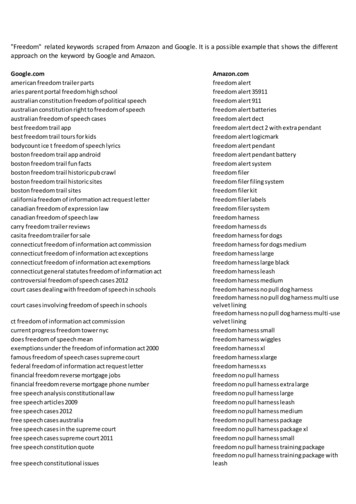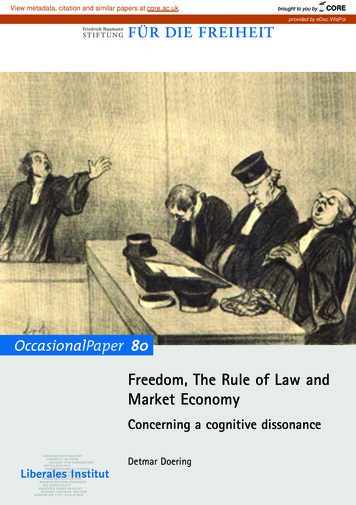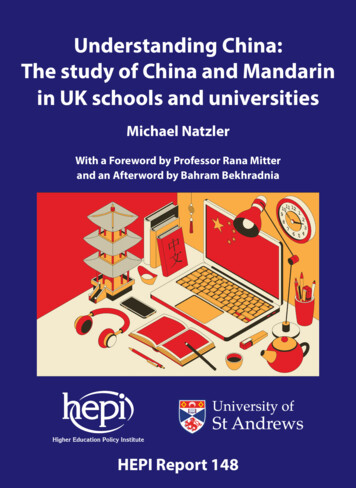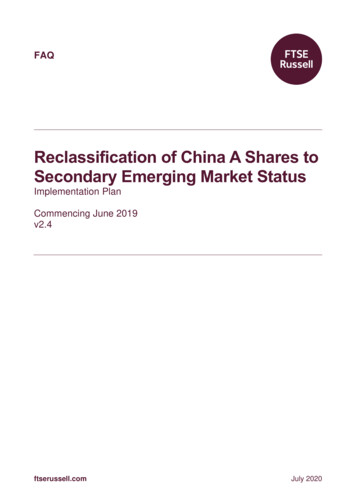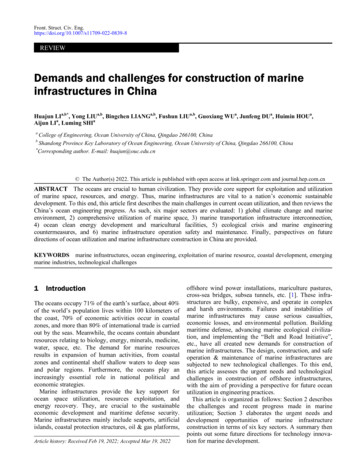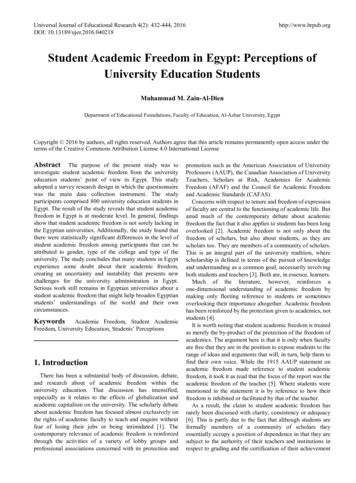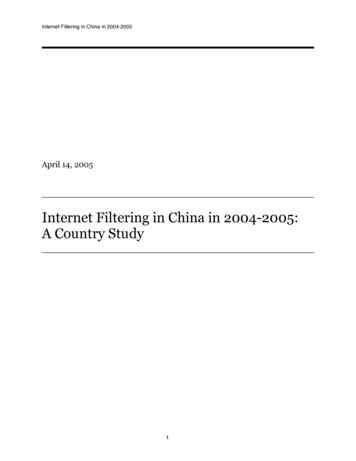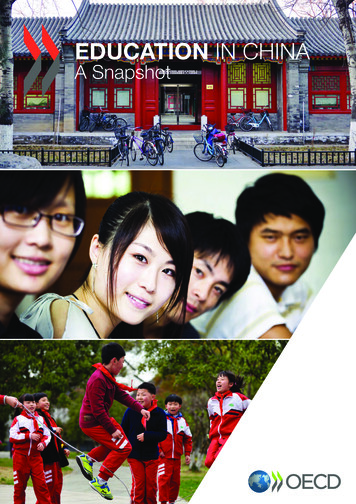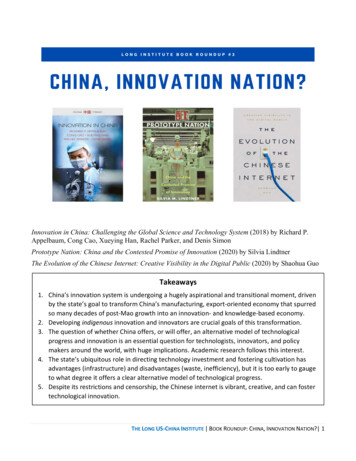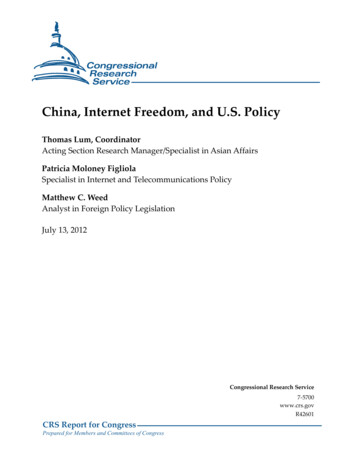
Transcription
China, Internet Freedom, and U.S. PolicyThomas Lum, CoordinatorActing Section Research Manager/Specialist in Asian AffairsPatricia Moloney FigliolaSpecialist in Internet and Telecommunications PolicyMatthew C. WeedAnalyst in Foreign Policy LegislationJuly 13, 2012Congressional Research Service7-5700www.crs.govR42601CRS Report for CongressPrepared for Members and Committees of Congress
China, Internet Freedom, and U.S. PolicySummaryThe People’s Republic of China (PRC) has the world’s largest number of Internet users, estimatedat 500 million people. Despite government efforts to limit the flow of online news, ChineseInternet users are able to access unprecedented amounts of information, and political activistshave utilized the Web as a vital communications tool. In recent years, Twitter-like microblogginghas surged, resulting in dramatic cases of dissident communication and public comment onsensitive political issues. However, the Web has proven to be less of a democratic catalyst inChina than many observers had hoped. The PRC government has one of the most rigorousInternet censorship systems, which relies heavily upon cooperation between the government andprivate Internet companies. Some U.S. policy makers have been especially critical of thecompliance of some U.S. Internet communications and technology (ICT) companies with China’scensorship and policing activities.The development of the Internet and its use in China have raised U.S. congressional concerns,including those related to human rights, trade and investment, and cybersecurity. The linkbetween the Internet and human rights, a pillar of U.S. foreign policy towards China, is the mainfocus of this report. Congressional interest in the Internet in China is tied to human rightsconcerns in a number of ways. These include the following: The use of the Internet as a U.S. policy tool for promoting freedom of expressionand other rights in China, The use of the Internet by political dissidents in the PRC, and the politicalrepression that such use often provokes, The role of U.S. Internet companies in both spreading freedom in China andcomplying with PRC censorship and social control efforts, and The development of U.S. Internet freedom policies globally.Since 2006, congressional committees and commissions have held nine hearings on Internetfreedom and related issues, with a large emphasis on China. In response to criticism, in 2008,Yahoo!, Microsoft, Google, and other parties founded the Global Network Initiative, a set ofguidelines that promotes awareness, due diligence, and transparency regarding the activities ofICT companies and their impacts on human rights, particularly in countries where governmentsfrequently violate the rights of Internet users to freedom of expression and privacy. In the 112thCongress, the Global Online Freedom Act (H.R. 3605) would require U.S. companies to discloseany censorship or surveillance technology that they provide to Internet-restricting countries. Italso would bar U.S. companies from selling technology that could be used for the purposes ofcensorship or surveillance in such countries.For over a decade, the United States government has sought to promote global Internet freedom,particularly in China and Iran. In 2006, the Bush Administration established the Global InternetFreedom Task Force, which was renamed the NetFreedom Task Force under the ObamaAdministration. Congress provided 95 million for global Internet freedom programs between2008 and 2012. The Broadcasting Board of Governors has spent approximately 2 millionannually during the past decade to help enable Internet users in China and other Internetrestricting countries to access its websites, such as Voice of America and Radio Free Asia.Congressional Research Service
China, Internet Freedom, and U.S. PolicySome experts argue that support for counter-censorship technology, which has long dominated theU.S. effort to promote global Internet freedom, has had an important but limited impact.Obstacles to Internet freedom in China and elsewhere include not only censorship but also thefollowing: advances in government capabilities to monitor and attack online dissident activity;tight restrictions on social networking; and the lack of popular pressure for greater Internetfreedom. As part of a broadening policy approach, the U.S. government has sponsored a wideningrange of Internet freedom programs, including censorship circumvention technology; privacyprotection and online security; training civil society groups in effective uses of the Web forcommunications, organizational, and advocacy purposes; and spreading awareness of Internetfreedom.Congressional Research Service
China, Internet Freedom, and U.S. PolicyContentsPolicy Overview . 1Internet Censorship. 2The Public-Private Nexus. 3Censorship Circumvention . 4Recent Developments . 5Weibo (Microblogs). 5New Regulations . 6U.S. Internet Companies in China . 6Google: Cyberattacks and Censorship. 8The Global Network Initiative. 9U.S. Government Actions to Promote Global Internet Freedom . 10State Department/USAID Efforts . 11NetFreedom Taskforce . 11Internet Freedom Promotion Activities . 12Broadcasting Board of Governors . 13Congressional Activities . 14Hearings. 14The Global Online Freedom Act . 15Further Policy Considerations . 16AppendixesAppendix. Global Network Initiative: Membership, Core Documents and ImplementationProcess. 17ContactsAuthor Contact Information. 20Congressional Research Service
China, Internet Freedom, and U.S. PolicyPolicy Overview1The People’s Republic of China (PRC) has the world’s largest number of Internet users, estimatedat 500 million people, including an estimated 300 million people with accounts on Twitter-likemicro blogging sites. Despite government efforts to limit the flow of information, ChineseInternet users are able to access unprecedented amounts of information, and the Web has servedas a lifeline for political dissidents, social activists, and civil society actors. “Netizens” havehelped to curb some abuses of government authority and compelled some officials to conductaffairs more openly.2 The Web also has enabled the public to engage in civil discourse on anational level. Some government departments have begun to solicit online public input on policyissues. However, the Internet has proven to be less of a catalyst for democratic change in Chinathan many foreign observers had initially expected or hoped. Along with its extensive internalsecurity apparatus, China also has an aggressive and multi-faceted Internet censorship system. In2011, Freedom House ranked China as one of the five countries with the lowest levels of Internetand “new media” freedom. According to some estimates, roughly 70 Chinese citizens are servingprison sentences for writing about politically sensitive topics online.3The development of the Internet and its use in China have raised U.S. congressional concerns,including those related to human rights, trade and investment, and cybersecurity. Congressionalinterest in the Internet in China is linked to human rights in a number of ways. These include theuse of the Internet as a U.S. policy tool for promoting freedom of expression and other rights inChina; the use of the Internet by political dissidents in the PRC and the political repression thatsuch use often provokes; and the role of U.S. Internet companies in both spreading freedom inChina and cooperating with PRC censorship and social control efforts.In addition to the effectiveness of censorship, some studies show that the vast majority of Internetusers in China do not engage the medium for political purposes. Although a small community ofdissidents and activists use the Web to broach political topics, they reportedly make up a smallminority—less than 10% of all users according to some estimates. Between 1% and 8% of Webusers in China use proxy servers and virtual private networks to get around government-erectedInternet firewalls to access censored content—both political and non-political.4The widespread satisfaction reportedly felt by many Chinese Internet users has reduced publicpressure for greater freedom. Although netizens have frequently protested against governmentactions aimed at further controlling Web content and use, the Internet in China offers a wide andattractive range of services, making restrictions almost unnoticeable to many users. Furthermore,some experts argue that the Internet in China has created an illusion of democracy by allowing1Written by Thomas Lum, Specialist in Asian Affairs.Yanqi Tong and Shaohua Lei, “Creating Public Opinion Pressure in China: Large-Scale Internet Protest,” East AsianInstitute (Singapore) Background Brief No. 534, June 17, 2010.3U.S. Department of State, 2011 Human Rights Report: China, May 2012; Reporters Without Borders,http://en.rsf.org/report-china,57.html; Freedom on the Net 2011, edom-net-2011. The top countries, in order of restrictions, are: Iran, Burma, Cuba, China, Tunisia, Vietnam, andSaudi Arabia.4Ed Zhang,”Does Blogs’ Blooming Mean Schools of Thought Can Contend?” South China Morning Post, December4, 2011; Rebecca MacKinnon, “Bloggers and Censors: Chinese Media in the Internet Age,” China Studies Center, May18, 2007; John Pomfret, “U.S. Risks Ire with Decision to Fund Software Maker Tied to Falun Gong,” Washington Post,May 12, 2010; Rebecca MacKinnon, Consent of the Networked, Basic Books: New York, 2012.2Congressional Research Service1
China, Internet Freedom, and U.S. Policypeople to vent their opinions online and by providing venues for debate on some political andpolicy issues.5 Moreover, many Chinese accept the government’s justification that it regulates theInternet in order to control illegal, harmful, or dangerous online content, services, and activities,such as pornography, gambling, slander, cyberattacks, and social networking by criminalorganizations.U.S. efforts to promote Internet freedom have broadened. Since the early 2000s, policy makershave focused on supporting censorship circumvention techniques and their use in China,protecting the privacy of Chinese Internet users, and discouraging or preventing U.S. informationand communications technology companies from aiding Beijing’s censorship efforts and publicsurveillance system. According to some analysts, counter-censorship technology has proven tohave a vital, but limited, impact on the promotion of freedom and democracy in the PRC. Theyhave advocated a broader approach or the development of a more comprehensive and robust mixof tools and education for “cyber dissidents” and online activists in China and elsewhere,including the following: software and training to help dissidents and civil society actorscommunicate securely through evading surveillance, detecting spyware, and guarding againstcyberattacks; archiving and disseminating information that censors have removed from theInternet; developing means of maintaining Internet access when the government has shut it downentirely; and providing training in online communication, organization, and advocacy.6Internet CensorshipThe PRC government employs a variety of methods to control online content and expression,including website or IP address blocking and keyword filtering by routers at the country’s eightInternet “gateways,”7 telecommunications company data centers, and Internet portals; regulatingand monitoring Internet service providers, Internet cafes, and university bulletin board systems;registering websites and blogs; and occasional arrests of high-profile “cyber dissidents” orcrackdowns on Internet service providers. Some analysts argue that even though the PRCgovernment cannot control all Internet content and use, its selective targeting creates anundercurrent of fear and promotes self-censorship. Blocked websites, social networking sites, andfile sharing sites include Radio Free Asia, Voice of America (Chinese language), internationalhuman rights websites, many Taiwanese news sites, Facebook, Twitter, and YouTube. OnlineEnglish language news sites, including the Voice of America, the New York Times, and theWashington Post, are generally accessible or only occasionally or selectively censored.Commonly barred Internet searches and micro-blog postings include those with direct andindirect or disguised references to Tibet, the Tiananmen suppression of 1989, Falun Gong, PRCleaders and dissidents who have been involved in recent, politically sensitive events, democracy,5Rebecca MacKinnon, “Is Web 2.0 a Wash for Free Speech in China?” RConversation, http://rconversation.blogs.com;MacKinnon, Consent of the Networked, op. cit.6Rebecca MacKinnon, “Global Internet Freedom and the U.S. Government,” RConversation, March 15, ent.html; EthanZuckerman, “Internet Freedom: Beyond Circumvention,” My Heart’s in Accra, February 22, net-freedom-beyond-circumvention-ethan-zuckerman/; Kelley Currie,“Winning the Battle over Internet Freedom,” CBS News, October 27, 2010; Rebecca MacKinnon, Testimony before theHouse Committee on Foreign Affairs, Subcommittee on Africa, Global Health, and Human Rights, December 8, 2011.7Routers at these gateways and Internet service providers, using algorithms as well as human editors, blockwebsites and politically sensitive keywords.Congressional Research Service2
China, Internet Freedom, and U.S. Policyhighly charged foreign affairs issues, and sexual material. The government reportedly also hashired thousands of students to express pro-government views on websites, bulletin boards, andchat rooms.The Public-Private NexusSome experts argue that China’s success in maintaining control over the Internet is based largelyupon its reliance on private sector actors and profit motives. By imposing non-coercive incentivesfor compliance, the government has been able to maintain a fairly reliable system of control atrelatively little cost. In order to maintain their business licenses and operate in China, domesticand foreign Internet companies are required to abide by a rough set of guidelines issued by centraland local government agencies—and thus encouraged to practice self-censorship. Companies thathave learned how to prosper in this environment include Baidu, China’s largest search engine,Sina Weibo, which offers a Twitter-like micro-blogging platform, and Tencent, which providesinstant messaging services.Large Internet portals are estimated to each employ hundreds of people to filter onlinediscussion.8 Sina Weibo is said to employ approximately 1,000 people to monitor and censorexpression on its social networking service.9 In May 2012, Sina instituted a point system in whichcustomers are given a number of starting points that are deducted if the they post “harmful”content. If a customer’s cache of points falls to zero, then his or her account is terminated.10Service providers are often torn between providing interesting content and allowing wide-rangingdiscussion, on the one hand, and complying with government guidelines, on the other, both ofwhich can affect their economic survival.Another aspect of the PRC government’s ability to control online information is the degree towhich the experience of the Internet user in China resembles that of Internet users in freerenvironments elsewhere. The abundant array of offerings on China’s Internet, vibrant newscoverage, public discourse on a range of issues, and selective rather than widespread use ofcoercive measures, such as arrests of netizens who use the Internet for political purposes, hasdiluted opposition to China’s censorship regime. Although their foreign counterparts are blocked,Chinese can search terms on Baidu, engage in social networking on RenRen and Kaixinwang, andblog or “Tweet” via Sohu and Sina platforms. These phenomena have even been referred to byChinese officials as “Internet democracy.” One U.S. expert states that “China’s 500 millionInternet users feel free and are less fearful of their government than in the past. Thecommunications revolution has transformed China in many ways, but the Communist Party hasthus far succeeded—against all odds and expectations—in controlling it to remain in power.”118MacKinnon, Consent of the Networked, op. cit.Loretta Chao and Josh Chin, “China Eases Crackdown on Internet,” Wall Street Journal, April 2, 2012; RebeccaMacKinnon, Testimony before the House Committee on Foreign Affairs, Subcommittee on Africa, Global Health, andHuman Rights, December 8, 2011.10Sina’s management said the aim of the measures is not to impose greater censorship but rather to create order.Offenses include spreading rumors, engaging in personal attacks, calling for protests, and using homonyms to disguisecomments on censored topics. Loretta Chao and Josh Chin, “China Microblog Site Regulates Talk—Users of ServiceAre Punished for Posting Content That Is Deemed Harmful,” Wall Street Journal, May 30, 2012; Michael Wines,“Crackdown on Chinese Bloggers Who Fight the Censors with Puns,” New York Times, May 28, 2012.11MacKinnon, Consent of the Networked, op. cit.9Congressional Research Service3
China, Internet Freedom, and U.S. PolicyCensorship CircumventionSince Internet-use became widespread in China in the mid-2000s, the government and netizenshave engaged in a game of cat and mouse, with new communications platforms challenging thegovernment’s efforts to control the Web, followed by crackdowns or new regulations, and then arepeat of the cycle. Bulletin and message boards, personal Web sites, blogs, micro blogs, andother communication outlets have allowed for an unprecedented amount of information andpublic comment on social and other issues. Although the state has the capability to block thedissemination of news or shut down the Internet, as it did in Xinjiang for several monthsfollowing the social unrest that erupted there in July 2009, it often cannot do so before suchevents are publicized, if only fleetingly, online.For Chinese Internet users in search of blocked information from outside the PRC’s Internetgateways, or “great firewall,” circumventing government controls (also known as fanqiang or“scaling the wall”) is made possible by downloading special software. These methods mainlyinclude proxy servers, which are free but somewhat cumbersome, and virtual private networks(VPNs), which are available at a small cost (roughly 40.00) but also enable securecommunication.12 Proxy servers and VPNs enable some motivated Internet users to avoidcensorship, but impose just enough inconvenience to keep foreign information out of the reach ofmost Chinese users. The use of these tools is tolerated by the government as long as it remainspolitically manageable, according to some observers. However, the government occasionally hasattempted to curtail their use, as in 2011, when users of VPNs began to experience interferencewith their access to foreign Web sites.13While remaining vigilant against Internet activities that it perceives may give rise to organized orpotentially destabilizing political activities, the PRC government has been careful not tounnecessarily provoke the ire of the general online population. Nor does it want to alienateChina’s international business community, which relies upon Internet services as well as VPNs. Inone dramatic example, the government backed down when confronted by an outpouring ofdomestic and foreign opposition to an initiative designed to filter content. In 2009, the Ministry ofInformation and Information Technology issued a directive requiring the installation of specialsoftware (“Green Dam Youth Escort” software), ostensibly created to block harmful contentpotentially affecting children, on all Chinese computers sold after July 1, 2009, including thoseimported from abroad. Many Chinese Internet users and international human rights activists,foreign governments, chambers of commerce, and computer manufacturers openly opposed thepolicy, arguing that the software would undermine computer operability, that it could be used toexpand censorship to include political content, and that it may incorporate pirated software andweaken Internet security.14 On June 30, 2009, the PRC government announced that mandatoryinstallation of the software would be delayed for an indefinite period and that any future policywould involve public input.15 One clear exception to this method of selective targeting, however,12Amy Nip, “HK Firms Help Mainlanders Get around the ‘Great Firewall’,” South China Morning Post, March 15,2011.13MacKinnon, Consent of the Networked, op. cit.; Charles Arthur, “China Cracks Down on VPN Use,” The Guardian,May 13, 2011.14In January 2010, a U.S. software firm filed a lawsuit against the Chinese government for copyright infringement,unfair competition, and other legal violations in connection with the Green Dam program. Agence France-Presse, “U.S.Software Firm Sues Chinese Government for US 2.2 Billion,” South China Morning Post, January 6, 2010.15“Green Dam Launch ‘Not Handled Well’,” http://www.chinaview.cn, August 14, 2009.Congressional Research Service4
China, Internet Freedom, and U.S. Policyis Tibet, where Internet censorship is often indiscriminate and repression of free speech andcommunication harsher than other parts of China.16Recent DevelopmentsIn the past decade, various online communications platforms have repeated a pattern of boom anddecline. In such cycles, Chinese Internet users enthusiastically adopted new technologies toexpress their opinions on current issues. They then faced growing government restrictions, butalso new opportunities as circumvention tools developed or new services became available. Thefirst medium that offered this possibility on a mass scale was bulletin boards attached to websites,followed by personal websites, and then blogs. The most recent sensation in China is Twitter-likemicroblogging.Weibo (Microblogs)In the short space of two years, Micro-blog sites (weibo), similar to Twitter,17 have become,according to some experts, the country’s “most important public sphere,” the “most prominentplace for free speech,” and the most important source of news.18 There are reportedly 300 millionmicrobloggers on platforms provided by major Chinese Internet service providers such as Sinaand Tencent. They have been at the forefront of exposing official malfeasance, corruption, andother sensitive news. In July 2011, for example, micro bloggers broke the news about the highspeed train crash near the city of Wenzhou that killed 40 passengers, as the government attemptedto control coverage and official news outlets delayed reporting. Microblogs have become sopopular that news sites and online portals have started highlighting “hot microblogs.” Chinesegovernment departments, elites, opinion makers, trend setters, and others, including governmentministries and officials, police departments, state media outlets, academics, celebrities, andcandidates for local people’s congresses have opened microblog accounts, as has the U.S.Embassy in Beijing.Chen Guangcheng’s Escape and the InternetIn the case of Chen Guangcheng, the blind legal advocate who in April 2012 escaped extra-judicial house arrest inShandong province, found refuge in the U.S. Embassy in Beijing, and ultimately was allowed to travel with his family toNew York City, both Chinese weibo and Twitter helped keep supporters and reporters apprised of his status.19 Thecomment sections of some Chinese official news sites reportedly were flooded with expressions of support for Chenand U.S. Ambassador Locke, who was instrumental in helping him. Chinese authorities closed the microblog accountsof some prominent political commentators and banned search terms related to Chen, including the following: hisname, initials, and home town; phrases such as “blind man” and “U.S. Embassy;” code words such as “ShawshankRedemption” and “The Great Escape”—two movies about escaped prisoners; and “UA898”—the United Airlinesflight from Beijing to Washington.16U.S. Department of State, Country Reports on Human Rights Practices for 2011, May 2012.Twitter is blocked in China but still used by many Chinese, particularly netizens with international connections.18Kathrin Hile, “China’s Tweeting Cops Blog to Keep Peace,” Financial Times, December 5, 2011; Keith B. Richburg,“In China, Microblogging Sites become Free-Speech Platform,” Washington Post, March 27,2011; Ed Zhang, op. cit.19For further information on Chen Guangcheng, see CRS Report R42554, U.S.-China Diplomacy Over Chinese LegalAdvocate Chen Guangcheng, by Susan V. Lawrence and Thomas Lum.17Congressional Research Service5
China, Internet Freedom, and U.S. PolicyThe PRC government has struggled to minimize the effects of posts and bloggers that undermineits leadership and policies, often clamping down on Internet communications over a politicallysensitive event, then relaxing, only to repeat the repeat the cycle as information about anotherevent leaks out online. It has stepped up pressure on Sina and other companies to censormessages or close accounts that “spread rumors” or “jeopardize the national or public interest.”20The government has become particularly nervous as news and rumors have spread in theblogosphere regarding the scandal involving purged Chongqing Party Secretary and Politburomember Bo Xilai and the arrest of his wife for the murder of a British businessman. In April2012, Sina reportedly terminated four weibo accounts alleged to have spread rumors inconnection with Bo Xilai.21New RegulationsThe PRC government has displayed an ongoing nervousness about the Internet’s influence onChinese society and politics and has developed an ever-expanding array of controls. However, ithas attempted to enact and enforce restrictions on Internet use judiciously and selectively and tolargely induce self-censorship and rely on Internet Service Providers rather than to imposepenalties directly, in order to avoid provoking a backlash among China’s online community. In2011, the State Council Information Office established two new agencies, the State InternetInformation Office and the Internet News Coordination Bureau, to help consolidate themanagement of Internet content, which is decentralized to a large degree. In recent years, PRCauthorities also have attempted to bolster their ability to monitor Internet users. Although thiseffort ostensibly has focused upon curtailing Internet pornography, the spread of falseinformation, and other illegal or socially disruptive content, it also has had a dampening effect onpolitical discourse. The central government and localities have attempted to require users toprovide their real names or official identification numbers or photos when they apply for anInternet account, website, or blog; post online comments; or patronize Internet cafes or otherpublic places.22 In 2012, new rules requiring users of social media platforms to register with theirreal names met with opposition from many Chinese Internet users and a low rate of compliance. 23Some of these policies reportedly have not been well-enforced, due in part to resistance amongservice providers which fear that they will adversely affect the popularity of their services.U.S. Internet Companies in ChinaAs U.S. Internet companies entered the Chinese market in the early 2000s, some of them becamedirectly or indirectly involved in PRC government censorship and surveillance efforts, whichconcerned some Members of Congress. In 2004, Yahoo! was blamed for providing e-mail accountholder information to state security authorities which resulted in the arrests of four ChineseInterne
security apparatus, China also has an aggressive and multi-faceted Internet censorship system. In 2011, Freedom House ranked China as one of the five countries with the lowest levels of Internet and "new media" freedom. According to some estimates, roughly 70 Chinese citizens are serving . Voice of America (Chinese language), international
